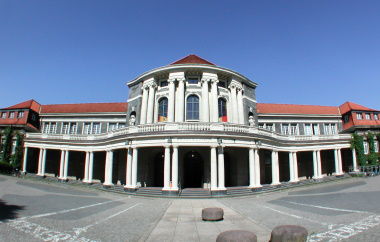The Universität Hamburg (UHH) is one of Germany’s largest universities with more than 40,000 students enrolled. It offers approximately 170 degree programs within its eight faculties, with excellent research opportunities. The university runs numerous interdisciplinary projects in a broad range of fields and has an extensive partner network of leading regional, national, and international institutions.
Universität Hamburg was named a University of Excellence alongside twelve other universities. As part of the Excellence Strategy of the German Government, the university has been granted four clusters of excellence for different core research areas. Among them is the Cluster of Excellence Climate, Climatic Change, and Society (CLICCS) which is located at the Center for Earth System Research and Sustainability (CEN).
Center for Earth System Research and Sustainability (CEN)
Since autumn 2011, the Center for Earth System Research and Sustainability (Centrum für Erdsystemforschung und Nachhaltigkeit, CEN) has pooled Universität Hamburg‘s research expertise in climate, environment and earth system sciences and is part of the local network KlimaCampus Hamburg (only available in German).
Oceanographers, meteorologists, geophysicists, marine biologists, geologists, soil scientists, geographers, biogeochemists, economists, and social scientists from the university work together on questions of global importance. Further, CEN often contributes to national and international cluster projects, such as the CLICCS (see below) or the Cluster of Excellence Integrated Climate System Analysis and Prediction (CliSAP).
A series of climate booklets to clarify science questions have been published by scientists and scholars from Universität Hamburg’s CEN and its Cluster of Excellence CliSAP.
Cluster of Excellence Climate, Climatic Change, and Society (CLICCS)
The Cluster of Excellence Climate, Climatic Change, and Society (CLICCS) aims to understand changes in climate, taking into account internal variability, extreme events, and unexpected side effects, by addressing the natural and social spheres as well as their interactions. CLICCS investigates how our climate changes and how society changes with it, creating feedback loops. It uses observations and models of the natural, coupled human-environment, and social systems to understand the processes governing these systems, and help to formulate adaptation and mitigation strategies.
The scientific objectives will be achieved through three intertwined research themes: providing the natural basis for understanding climate system dynamics, investigating the climate-related dynamics of social systems, and focusing on coupled human-environment dynamics on a regional level, where climate change becomes visible and where sustainable adaptation can be realized by local actors.
To act as an enabler for decision makers it will distill results on possible and plausible futures within CLICCS and worldwide into an annual Hamburg Climate Futures Outlook.
CLICCS is run by CEN in close cooperation with the Max Planck Institute for Meteorology (MPI-M), the Helmholtz-Zentrum Geesthacht, Centre for Materials and Coastal Research (HZG), and German Climate Computing Center.
The research and work of the Universität Hamburg contributes to all 17 Sustainable Development Goals.






